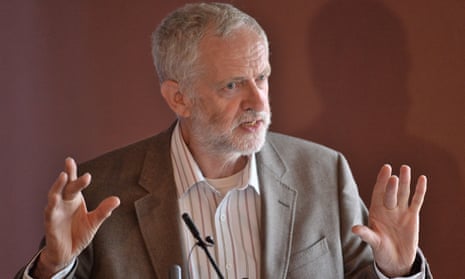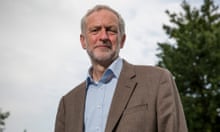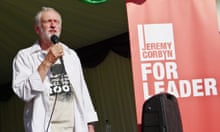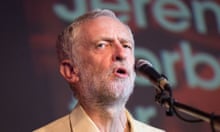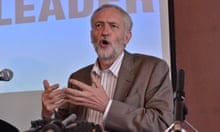The Labour party should “end the madness” of a growing surge in support for Jeremy Corbyn and elect Yvette Cooper on the grounds that she has “the intellect, the experience and the inner steel” to succeed as leader, Alan Johnson has said.
Amid growing nerves among senior party figures that Corbyn is building up an apparently unstoppable momentum, Johnson described the veteran leftwinger as “cheerfully disloyal” and praised Cooper as the unity candidate.
Writing for the Guardian, the former home secretary says: “In my view only Yvette Cooper can unite the party to win again. Those members who can’t give her their first preference should give her their second. After over a century of male leaders we have an election where the most qualified candidate to lead our party back to government happens to be a woman. Let’s end the madness and elect her.”
Johnson launched a strong attack on Corbyn and his supporters for disloyalty to progressive Labour governments as Harriet Harman stepped up her efforts to weed out “entryists” on the left and the right who may have signed up to disrupt the leadership contest. The interim Labour leader has written to every Labour MP with the names of people in their constituency who have signed up as party members or registered as supporters since the election.
Harman wants the MPs to report any of the new members or registered supporters who are members of other parties or are known troublemakers. Registered supporters have to pay a £3 fee and sign a statement saying they are committed to Labour values. Figures show that 20,000 new members and a further 21,000 registered supporters have signed up since nominations for the leadership closed.
In her email to MPs, Harman wrote: “All concerns raised are being acted on. As a member of parliament your local knowledge and information is important to uphold the integrity of the leadership election.”
Some Labour MPs have been saying in private that some supporters of Corbyn are signing up people who have no real commitment to the Labour party and are more natural members of the Trade Unionist and Socialist Coalition. The Corbyn team dismiss these claims and say that the veteran MP for Islington North is winning over young people who are flocking to packed meetings around the country.
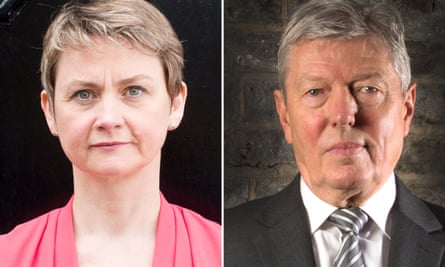
Corbyn brushed aside suggestions that he would face an internal coup to depose him if he became Labour leader, as he said he would follow the example of Abraham Lincoln who acted as a unifying figure towards the end of the American civil war. Speaking in Leeds at the launch of an economic plan to rejuvenate the north of England, he said: “Plots and double plots and sub-plots and plotting – it’s fascinating. I think Abraham Lincoln made a point. At the end of the American civil war he said, ‘with malice toward none and charity towards all’ we will go forward. I am sure that is the right way to do things.”
But Johnson warned of the danger of a Corbyn victory as he said that supporters who shout betrayal at Cooper and other members of the last government should remember a series of progressive measures, including the minimum wage and greater rights for trade union members, introduced by the Blair and Brown governments. “Jeremy’s ... been cheerfully disloyal to every Labour leader he’s ever served under,” Johnson writes. “That’s fine so long as members understand that it’s the loyalty and discipline of the rest of us that created the NHS, the Open University.”
Sources in the Corbyn campaign suggested that the Johnson intervention would backfire on the grounds that Labour members will be unimpressed by his negative tone. A spokesperson for the Corbyn campaign said: “Whatever anyone else says in this leadership election, Jeremy Corbyn is keeping it positive, about policies for growth rather than austerity, not personal attacks. Jeremy’s giving a positive lead and focusing on unity, not division.”
The campaigns by Cooper and the shadow health secretary, Andy Burnham, have been thrown into turmoil by the success of Corbyn, who is speaking to packed meetings across the country. The fourth candidate, the shadow social care minister, Liz Kendall, is struggling to win support.
Corbyn built up significant momentum last week after Unison and the Communication Workers Union (CWU) followed Unite’s move in backing him. But Johnson, one of the few Labour “big beasts” from the last government who is still left in the House of Commons, is scathing about Dave Ward, the general secretary of the CWU, his old union, who endorsed Corbyn on the grounds that he is the “antidote” to the “virus” of Blairism.
Johnson, who led the CWU’s predecessor union before entering parliament in 1997, says: “I can understand why the ‘virus’ drivel should emanate from our political opponents, including those in the various far-left sects who last tried to bring their finger-jabbing intolerance into our party 35 years ago. What I’m puzzled by is why it should come from trade union leaders whose members benefited so much under the last Labour government.”
Dubbed Tony Blair’s favourite trade union leader, Johnson is associated with the Blairite wing of the party. His backing for Cooper suggests that the Blairite wing now believes she is the candidate with some modernising credentials who is best placed to beat Corbyn.
In his article, Johnson also addresses the recent fiasco of the Labour vote on the government’s welfare reform bill, which has inflicted immense damage on the campaigns of Cooper and Burnham. Critics have accused them of cowardice for expressing opposition to the bill, only to follow instructions from Harriet Harman to abstain in a commons vote.
The two shadow cabinet ministers voiced unease about Harman’s tactics but agreed to follow her lead to preserve party unity. Johnson writes: “The Commons vote on the welfare bill was a mess. Shadow cabinet members felt they had to support collective responsibility. Jeremy had no such constraints ... Are the other three candidates to be condemned for an abstention in opposition but not applauded for being part of the government that helped to increase the income of the working poor in the first place?”
The main focus for Corbyn on Tuesday was on his plans to rebalance the British economy to build up the cities of the north. A train enthusiast, he called for greater investment in the railways to bring the service in the north up to the higher standards in the south and for the rail network to be returned to public ownership when franchises expired.
